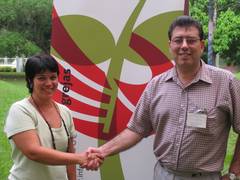19.10.05
Latin American WCC pre-Assembly discusses breaking down barriers and prejudice

Magali do Nascimento Cunha, a Brazilian Methodist professor, and Jorge Vaccaro, an Argentine Pentecostal pastor, agree that it is time for mutual prejudices to end.
It is time to break down the prejudices and traditional barriers between "Evangelical" Pentecostals and "ecumenical" Protestants, according to a panel discussion at a preparatory event for the World Council of Churches (WCC) Assembly.
One of the challenges for churches in Latin America today is "to overcome old antonyms" said Argentine Pentecostal Pastor Jorge Vaccaro of the Church of God Association, at the event which took place in Mendes, Brazil from October 16-18.
"There is no place for polarization between the ecumenical and the Evangelical or between the ecumenical and the Pentecostal," he said. "These realites are not mutually exclusive but rather complement each other," he added.
Vaccaro claimed that the Latin American Pentecostal churches are "true therapeutic communities" that "allow believers to revalue the person".
He further emphasized that they have an "important contribution" to make in the spiritual arena. Their insistence on the "supremacy of the experiential faith" recalls the "profound and immediate realities of the human person".
However, he added, they should be self-critical and recognize that "numerical growth hides certain dangers". The effect of the "seduction of power" can be perceived In the leadership of many communities, he said.
According to Vaccaro, Pentecostal churches "should move away from an individualist and futuristic faith" and "work for peace," recovering a "serious prophetic dimension that is committed to current society".
Professor Magali do Nascimento Cunha of the Methodist Church of Brazil agreed with Vaccaro. "The prejudice that the so-called historic churches have toward Pentecostal expressions must be broken down," she said, along with the "exclusivity of the Pentecostal groups and leaders who disqualify and reject the religious expression of the churches of the Reform."
Cunha also underscored the temptation hidden in an obsession with the numeric growth in a context of market religiosity. Differentiating between visibility and public presence, she emphasized that the first is related to obtaining media space, while the second "demands commitment and identification with social causes". The challenge to the church is not visibility
but public presence which, in theological terms, is translated as "incarnation".
At the same time, in an individualist world that is subject to growing privatization, the church is called to create "spaces for community life and mutual support". "We are not going to raise people's awareness with documents, but only with ecumenical experiences," she said.

